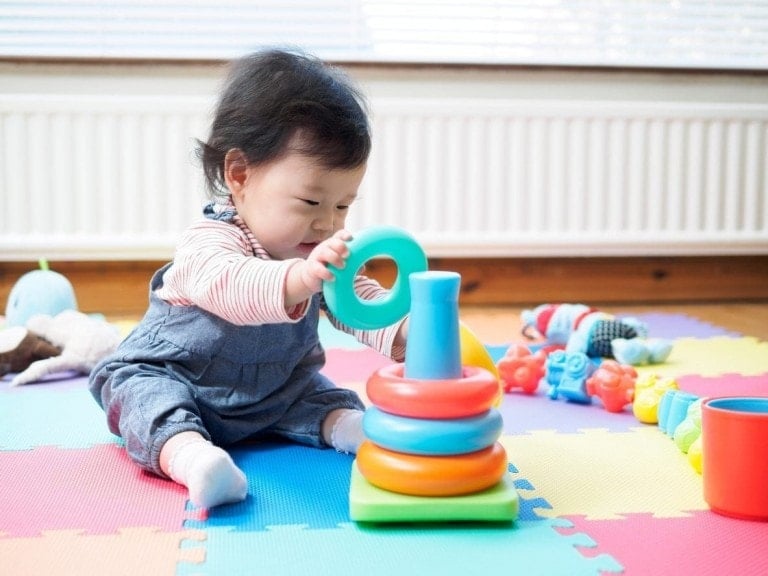When I was in my early twenties without children, I distinctly remember waiting for a table at a restaurant, watching a very spunky child ignore his exasperated parents’ corrections in the waiting area, and thinking – “What kind of parents raise children like this that don’t listen? Where have they gone wrong?”
And now, 12 years into parenting, I can humbly say the answer to that question is — “Me. I’m that parent at times.”
Yes. I’m the parent who can sometimes feel like I have children metaphorically motioning toward me: “Nah, Nah, Nah, Nah, Nah, Nuh! I can’t hear you!!” – as my boys continued wrestling each other at bedtime and acting like they didn’t hear me tell them to stop despite me standing within three feet of them. And there is almost NOTHING that can feel more frustrating to me.
How to Get Your Kids to Listen
As a mom, you know there is a BIG difference between a child hearing their parent versus listening to them. It can be hard to understand how to make them listen when you don’t know what to do to help.
But have no fear. There are simple tools that can help any child improve their listening skills. But they begin with the parent. So let’s dig in:
1. Start With Teaching Respect
Children are old enough to learn about respect from the time they can rebel against you. Is it easy to remember the first time you saw your child disobey you? My husband and I always joke that it’s a monumental moment when your precious baby has their first act of rebellion – like hitting a sibling or turning their back to you. But when you begin to see those decisions take place, you know they can understand right and wrong to a certain degree.
From this point, it is important to begin teaching your child that their job is to respect you and your job is to love and protect them, which happens when they listen to what you ask of them. You can also help define respect for them. Your definition may look different from mine. But in my home, we focus on respect, meaning that my child’s words, actions, and body language show me that they understand I am the one who makes the best decisions on their behalf.
When that child shows respect, talk about it with them. Praise them. Say things like, “You listened the first time, and that was a great way to show Mommy respect. That will get you far in life. Thank you.”
2. Teach Them How to Show They Are Listening
When you see recurring instances in your interactions with a child that seem to show a lack of listening, form a game plan with your child to break those patterns and model what they should be doing instead.
For instance, if you often notice them running away in the parking lot and don’t look back, say, “When we get out of this car, I need you to hold my hand and stay by my side. Cars may not see you if you run away because you are short. So when I say I need you to do something, I need you to do it as soon as I say it.”
Then, practice saying, “Come here.” Have the child run back to your side. This will prepare them to do that when the actual parking lot comes. Continue to practice other circumstances where they must listen.
3. Avoid Needless Correction or Yelling
When someone needlessly yells or is harsh, it is human nature to begin to tune them out or take their yells less seriously because we hear it all the time. Likewise, kids are less apt to listen to your stern voice if you are equally harsh when they don’t wipe their face with a napkin as when they run across the street without looking.
In day-to-day interactions, children don’t learn by being yelled at. Instead, they learn by being taught and having consequences if they choose not to listen. But often, parents get so used to yelling about everything that kids stop listening to anything.
So, as a parent, if you want a child who listens to you, practice using your stern voice or yelling in a situation of danger or serious misbehavior. Not all behaviors are created equal. We want our children to know there are times when NOT listening is not an option for their safety and emotional well-being.
Pro tip: My favorite tip for getting a child to listen is to lower my voice because they must get close to me to hear. It also is a different way of communicating than they are used to, so they are prone to come close to listen.
4. Stay Consistent With Expectations
Sometimes, it seems cute if a child gets an attitude or shows some sass. But laughing in these instances or letting that behavior off the hook is not productive in the long term. If you want your kids to listen, they need to know that your expectations don’t vary whether they have a huge group of friends over or are alone with just you.
If you are in public and your child is not listening well, pull them aside so as not to embarrass them. Let them know that they will have a consequence for their lack of listening instead of yelling at them in front of everyone.
I will always tell my sons when I begin to see any lack of listening, big or small, “That was not a huge sign of disrespect or ignoring me, but I expect you to do this next time instead,” and I seek to set the expectation.
5. Use Catchphrases
There is a reason teachers use phrases like “1, 2, 3, eyes on me” or “Put your listening ears on.” Kids do well when songs or phrases give them cues to listen. So feel free to make up your own or use ones that have already been established. For example, here is a great song by Jack Hartmann that encourages whole-body listening.
6. Emphasize Eye Contact
One of the easiest ways to encourage a good listener is to teach your child to make eye contact with you when you are speaking. This practice starts from a young age but sets you and the child up for success as they grow. As mentioned above, using “1,2,3, eyes on me” is a great way to teach this at home. Or wait until they make eye contact to tell them something they want to hear about. This is a wonderful way to develop the habit.
7. Teach Them That Good Listeners Get More Freedom
Last but not least, teach your child that they get more freedom from you when they show they can listen well the first time. Parents who can call a child’s name and the child responds will give the child more freedom. For example, a good listener might walk without holding a parent’s hand versus a child who shows they don’t obey. When your child sees the fruit of their obedience, they will be motivated to continue good listening skills. It’s a win/win for all.
I hope you have found these tips helpful. Let us know which was your favorite and what we missed!



































